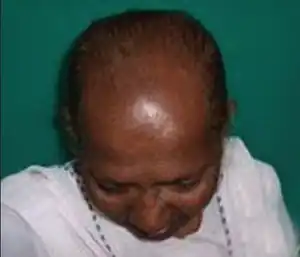Achard–Thiers syndrome
| Achard–Thiers syndrome | |
|---|---|
| Other names: Diabetic-bearded woman syndrome | |
 | |
| Individual presents with androgenetic alopecia, and hirsutism | |
Achard–Thiers syndrome (also known as diabetic-bearded woman syndrome) is a rare disorder mainly occurring in postmenopausal women. It is characterized by type II diabetes mellitus and signs related to the overproduction of androgens.[1]
The disease is named for Emile Achard and Joseph Thiers.[2]
Signs and symptoms
Achard–Thiers syndrome affects mostly postmenopausal women and comprises diabetes mellitus, deep voice, hirsutism, clitoral hypertrophy and adrenal cortical hyperplasia or adenoma. Patients often also have amenorrhoea, hypertension and osteoporosis.[3]
Diagnosis
The diagnosis of this condition is based on clinical findings, additionally a oral glucose tolerance test is done to further ascertain Achard–Thiers syndrome[4]
Treatment
In terms of management for older women hormone replacement therapy is used. Diabetes can be treated with insulin/other medications[4]
References
- ↑ "Achard Thiers Syndrome". NORD (National Organization for Rare Disorders). Archived from the original on 2020-09-26. Retrieved 2020-07-30.
- ↑ Pal, Lubna (2013). Polycystic Ovary Syndrome: Current and Emerging Concepts. Springer Science & Business Media. p. 97. ISBN 9781461483946. Archived from the original on 14 November 2021. Retrieved 7 November 2017.
- ↑ Braun-Falco, Otto; Plewig, Gerd; Wolff, Helmut Heinrich; Burgdorf, Walter H. C. (2012). Dermatology. Springer Science & Business Media. p. 1115. ISBN 9783642979316. Archived from the original on 14 November 2021. Retrieved 7 November 2017.
- 1 2 "Achard Thiers Syndrome". NORD (National Organization for Rare Disorders). Archived from the original on 26 September 2020. Retrieved 13 November 2021.
- B.G. Firkin & J.A.Whitworth (1987). Dictionary of Medical Eponyms. Parthenon Publishing. ISBN 1-85070-333-7
- Who Named It? Archived 2020-02-06 at the Wayback Machine
External links
| Classification |
|---|